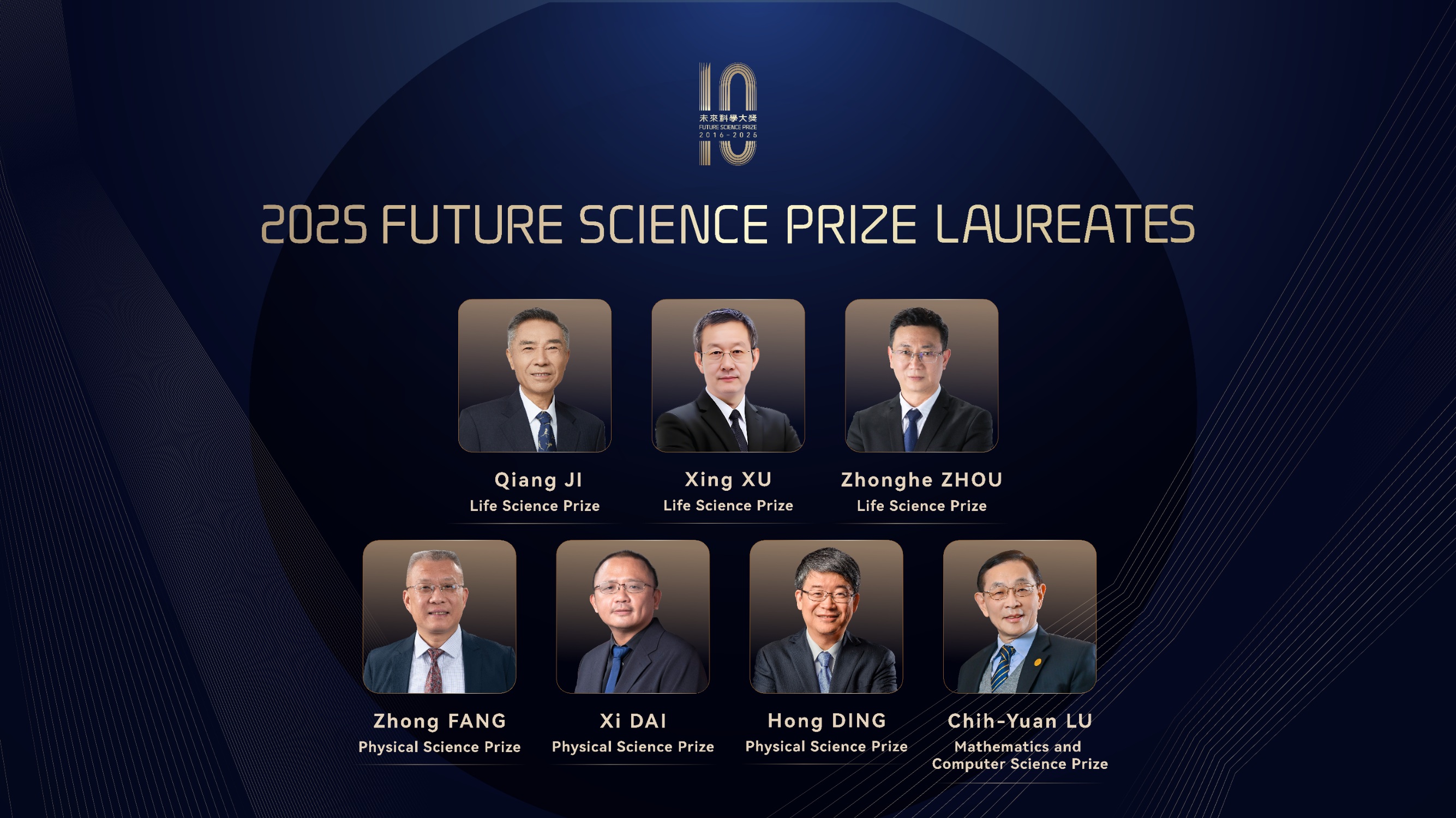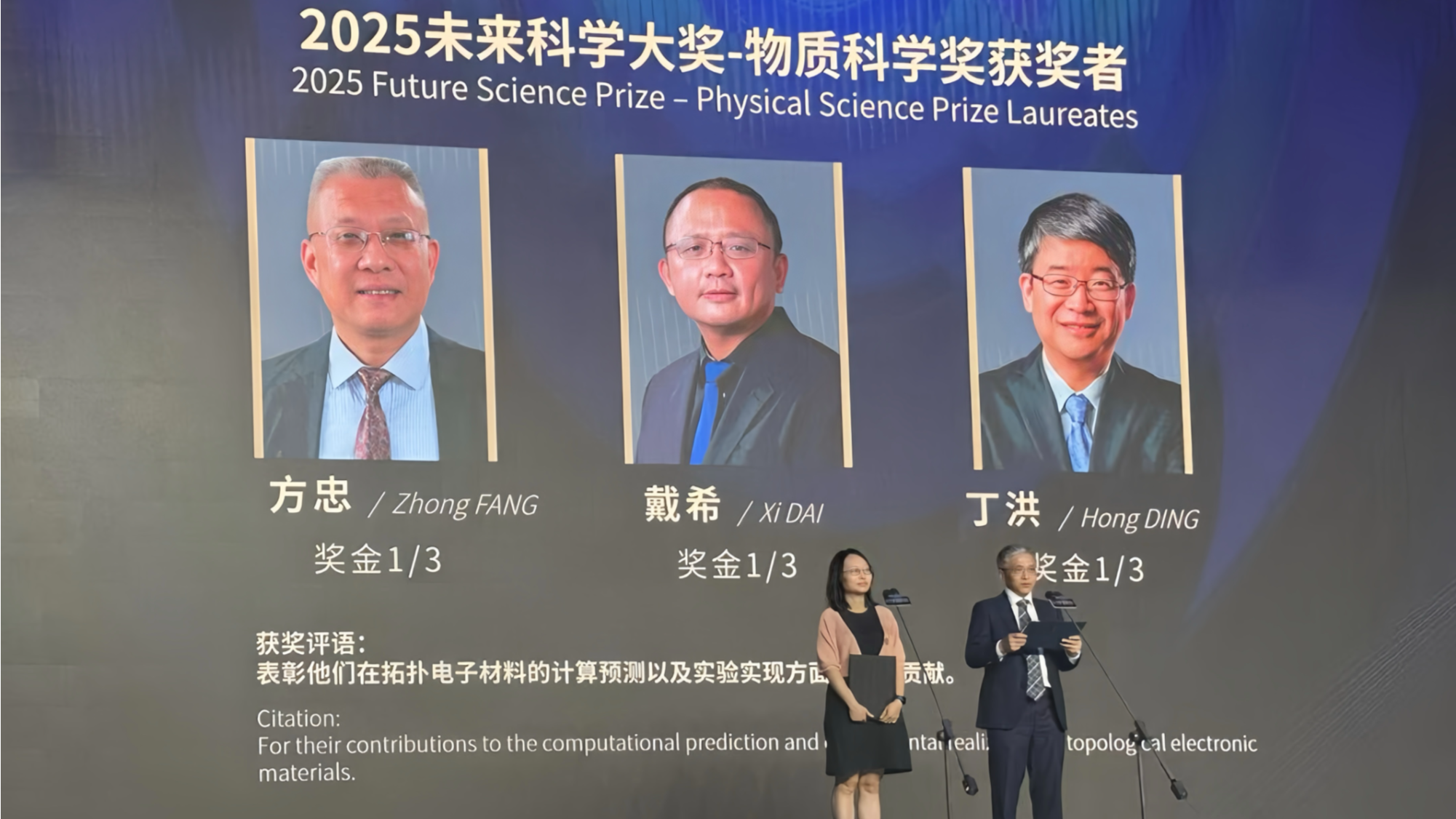
Dai Xi, a physicist from the Hong Kong University of Science and Technology (HKUST), is among the seven laureates of the 2025 Future Science Prize – a prestigious Chinese non-governmental award – for his discovery in condensed matter physics and topological electronic materials.
Celebrating its 10th anniversary this year, the prize’s list of awardees was simultaneously revealed in Beijing and Hong Kong on Wednesday, with the Life Science Prize, Physics Science Prize and Mathematics and Computer Science Prize being given to seven Chinese scientists who have made outstanding achievements in their corresponding fields.
Dai, chair professor of physics at the HKUST, shared the physic science trophy with Fang Zhong from the Chinese Academy of Sciences Institute of Physics, and Ding Hong, who works at Tsung-Dao Lee Institute of Shanghai Jiao Tong University, for their groundbreaking achievement in uniting abstract topology with the practical functionality of electronic materials.

READ MORE: Mainland scientists sweep Future Science awards
Renowned globally for his study on quantum materials, Dai won two landmark prizes last year — the first class of the State Natural Science Award, the nation’s top honor in the realm of nature science, and the Tan Kah Kee Science Award in Mathematics and Physics.
Dai hailed the honor as the best reward for the continuous efforts of his team, which has enabled China to rank among the international forefront in this field of research.
Dai pledged to continue to leverage Hong Kong's unique advantages in academic research to contribute to the country's technological progress.
This year’s Life Science Prize was awarded to Ji Qiang from the Hebei University of Geosciences, and Xu Xing and Zhou Zhonghe, two scientists working at Chinese Academy of Sciences Institute of Vertebrate Paleontology and Paleoanthropology. The trio’s work provided definitive evidence that birds are living descendants of theropod dinosaurs, and transformed a long-standing debate into a widely accepted scientific theory.
Lu Chih-yuan is the sole laureate of this year’s Mathematics and Computer Science Prize. The Guangzhou-born scientist has contributed innovation and leadership in advancing non-volatile semiconductor memory technologies, including cell density, device integration, and data resiliency.

The awards ceremony will be held on Oct 26, coinciding with an expert-filled Future Science Prize Week, which will take place in Hong Kong for the third time in the prize’s history, taking place from Oct 22 to 26.
It will be the largest ever prize week, with about 100 top scientists, including four Nobel Prize laureates, sharing their insights.
Delivering a pre-recorded speech at Wednesday’s announcement ceremony, Sun Dong, the Hong Kong Special Administrative Region (HKSAR)’s secretary for innovation, technology and industry, noted that the Future Science Prize has inspired countless researchers over the past decade, evolving into a powerful and influential brand for the country while making significant contributions to promoting scientific progress in China and beyond.
Sun said the Hong Kong Academy of Sciences has always been an essential partner of the HKSAR government, and had organized over 500 scientific events during the past decade, contributing significantly to nurturing talents in innovation and technology and enhancing the overall atmosphere for scientific innovation in Hong Kong.
The inno-tech chief also invited people to attend the Future Science Prize Week in Hong Kong to experience the city’s innovation vibe and witness the power of science.
Dennis Lo Yuk-ming, co-chair of the Program Committee of 2025 Future Science Prize Week and president of The Chinese University of Hong Kong (CUHK), thanked the SAR government for its support, and for igniting the SAR’s atmosphere of science and technology innovation.
READ MORE: Popular science lights years of knowledge, progress
Lo, as a winner of the Future Science Prize at its inaugural edition in 2016, said that among the 46 laureates of the award over the past decade, six have backgrounds related to Hong Kong, a fact that convinces him that this is the golden age for Hong Kong's innovation and technology sector.
Lo said he is confident that more Hong Kong youngsters will tend to engage in scientific research with the increased resources for scientific and technological innovation in the city.
The Future Science Prize was established by a group of scientists and entrepreneurs in 2016 to reward scientists who have made outstanding scientific achievements in the Chinese mainland, Hong Kong, Macao and Taiwan. Focusing on original basic scientific research, each prize includes a reward of $1 million.
Contact the writer at atlasshao@chinadailyhk.com


